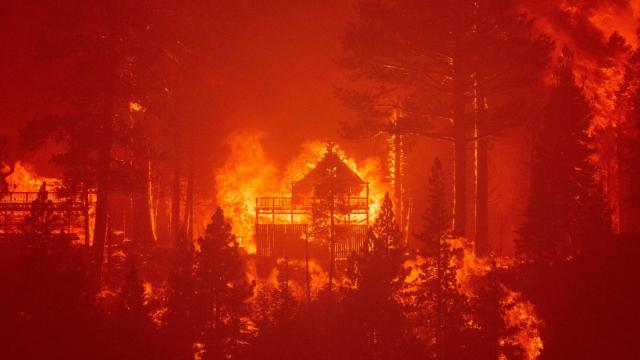On Monday, the U.S. government released data showing that 2021 was the third-costliest year for extreme weather on record. It was also the highest tally for the number of disasters that cost $US1 (A$1.39) billion or more, beating 2020, and the deadliest year in a decade.
Those stats are stark, but they don’t tell the full story. At the individual and community level, climate disasters are doing irreparable harm. Taken together, 2021’s run of monster disasters made it clearer than ever that merely adapting to the climate crisis will never be enough.
Consider that last year, Greenville, California, and Mayfield, Kentucky — two formerly vibrant towns — were all but wiped completely off the map by a wildfire and tornado, respectively. These are life-altering events for those thrust onto the frontlines of the climate crisis.
The concept of bad weather “seasons” now seems increasingly quaint, a relic of the 20th century like CRT television sets and the Model T. Freakish heat waves are now an every-month occurrence. We saw it in the Pacific Northwest this summer, where all-time temperature records were obliterated amid a mass casualty event, just as we saw in Colorado this December, where unseasonably warm weather left the ground bereft of snow and allowed the state’s most destructive wildfire in history to overrun suburban neighbourhoods.
Hurricane season is also stretching to new lengths, with the National Oceanic and Atmospheric Administration issuing warnings in what was once the shoulder season. At the peak of the hurricane season, hotter oceans are feeding increasingly violent storms like Hurricane Ida. The hotter atmosphere also ensures more rain falls; this was true with Ida, even as it “withered” into a tropical depression.
The list goes on. Don’t get me wrong, there is an urgent need to adapt to the disasters the climate crisis is throwing at us with increasing ferocity. The world has already baked in an unhealthy dose of climate chaos with the carbon already pumped into the atmosphere; if greenhouse gas emissions magically ended tomorrow, the world would still need a massive program to adapt to the changes that have already begun to run their course. There’s also a need for strong planning that moves people out of harm’s way via managed retreat programs, hardening infrastructure that exists in places vulnerable to climate disasters, and social programs that can help communities cope. That planning, where it even exists, is largely ad hoc. Clearly, we need a more coherent plan for society’s climate-induced evolution.
But the staggering economic and human toll of the climate crisis on display in 2021 shows we will never be able to fully rely on adaptation. A plethora of research also bears this out. To take but one example, findings published in 2019 show a $US400 (A$557) billion program to harden coasts likely wouldn’t be enough to slow the rising tide. Failing to address the root causes of the crisis would shave an incredible $US23 (A$32) trillion off the global economy by mid-century, according to an analysis published last year by re-insurance giant Swiss Re. Some of what we lose if we rely solely on adaptation has no dollar value. How do you put a price on a tree endemic to a small handful of Florida ravines? A wolf in the snow, its breath caught on the winter morning air?
Yet just as adaptation remains ad hoc, so do attempts to wind down fossil fuel use and production despite the evidence of the risks of failure being bright as day. That absolutely has to change, starting now. I know this point has been made over and over and over again (including on this very site), but it really bears repeating as we stare into the abyss of nightmare statistics about economic losses and deaths — and heartbreak that sits just beneath the surface.
